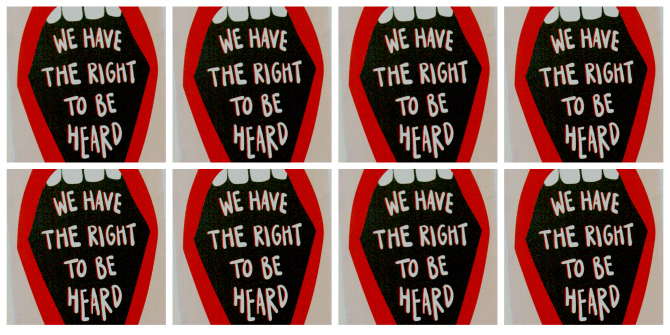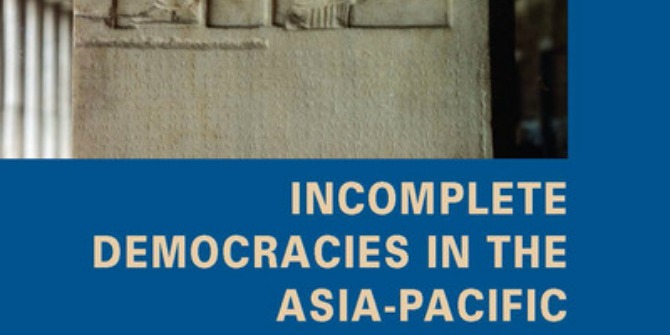8 March 2018 welcomes International Women’s Day, with this year’s theme being #PressforProgress. For the course of the month, LSE Review of Books will be centralising women’s voices, while also discussing wider issues surrounding diversity and inclusion in academic publishing. Managing Editor of the blog, Rosemary Deller, introduces the rationale and aims behind this endeavour.
If you would like to contribute to this project in this month or beyond, please contact us at Lsereviewofbooks@lse.ac.uk. Check out the reviews and features published throughout the month here.
A Month of Our Own: Amplifying Women’s Voices on LSE Review of Books
 Image Credit: Women’s March, 2018 (Erik Drost CC BY 2.0)
Image Credit: Women’s March, 2018 (Erik Drost CC BY 2.0)
This month welcomes International Women’s Day (IWD), an annual event held on 8 March, and is also Women’s History Month in the USA. In the UK, the 2018 IWD celebrations hold particular significance as this year marks the centenary of 40 per cent of women in the UK succeeding in gaining a vote in national elections – although it would not be until 1928 that all women over the age of 21 had full voting rights with the Equal Franchise Act.
2018 was also, however, provocatively proposed by Kamila Shamsie as the ‘Year of Publishing Women’. Writing in the Guardian in 2015, the novelist called for publishers to exclusively release books by women in 2018 to begin redressing the long-standing gender imbalance within the publishing industry. In her article, Shamsie particularly focused on the ways in which books are selected, marketed and received, including the culture surrounding literary prizes. Yet, publishing is also a sector whose workers are predominantly women, but which experiences a continued gender pay gap with senior positions largely filled by men; a recent study has furthermore shown that the industry remains ’90 per cent white’. It is in this context that the November 2017 Building Inclusivity in Publishing event, held in London, explored how conscious and unconscious exclusions on the grounds of gender, race, sexuality, disability, class and regionalism, amongst other intersecting categories, not only impoverish the publishing world, but society more broadly.
And what about academic publishing? Much critical attention has been paid to the voices that continue to be broadcast at a higher volume across a variety of disciplines. Here at LSE, three PhD students in the International Relations department examined the reading materials studied as part of LSE IR courses at undergraduate and postgraduate levels: the results revealed a severe gender bias. Dr Alice Evans (Kings College, London) and Duncan Green, LSE Professor in Practice in International Development, have recently encouraged others to undertake an audit of their reading materials, giving consideration not only to gender, but also to the ways that race, geography and class inflect the figures. These studies and activities also complement wider moves and calls to ‘decolonise’ academia, as students at universities including LSE and UCL ask ‘why is my curriculum white?’.
The theme of this year’s International Women’s Day is #PressforProgress: encouraging us to call out and respond to continued inequalities that are typically structural in nature, but which require individual and collective action to address. Part of this arguably involves a reckoning with the potential problems in your own backyard. So, at the tail-end of 2017, as the Managing Editor of the LSE Review of Books blog since October 2015, I turned the lens on our output to see how the reviews published under my editorship were reflecting (and potentially contributing to) continued gender imbalances in academic publishing.
The results were disappointing, to put it mildly. Looking at reviews commissioned by and published on LSE Review of Books between January 2016 and December 2017, around two-thirds of featured books were authored by one or more men. Moreover, in parallel with the findings of the LSE IR audit, this was particularly distorted by the tendency for co-authored books to be predominantly male-authored: we published reviews of 62 books with two or more male authors. While 46 had a mixed gender authorship, only 19 books were edited or authored by two or more women. This imbalance narrowed when it came to contributors, yet there remains a 59 per cent/41 per cent split between men and women reviewers, respectively.
This audit is not as complete or ‘official’ a survey as that undertaken by my LSE colleagues. However, this cursory snapshot does parallel the gender bias that has been found to shape academia, and the social sciences in particular. Yet, especially in relation to the statistics regarding reviewers, it nonetheless instigated some reflection on my own responsibilities as editor of the LSE Review of Books blog. I had made the error of assuming that because I consider myself a feminist and attentive to issues surrounding exclusion, that this would translate into equal commissioning, equal representation: an inclusive reader and writer community. While this is hardly a revelatory point – indeed, this is belated recognition of what others have repeatedly and no doubt wearily underscored, especially in relation to racial inequalities – the audit made clear the dangers of a complacent faith in the alchemy of good intentions. In other words, the belief that simply by having ‘good’ thoughts and hopes and being ‘aware’ of inequality, this will magically engender diversity, inclusion, equity. It does not.
So, inspired by Shamsie’s call, critical discussions about widening the landscape of publishing, contemporary feminist movements, the theme of this year’s IWD, our own gender gap and other influences besides, LSE Review of Books is responding by running a month centring women’s voices. It is vital here to acknowledge that gender is certainly not lived or experienced as a binary construct limited to or encompassed by two categories of man/woman, masculinity/femininity; neither should gender be viewed as the intrinsic priority, the experience of which can be easily isolated from other intersecting oppressions and inequalities. We hope this will be reflected in some of our publishing this month as we also make some initial entry-points into considering converging exclusions in the publishing world. While the aim to #PressforProgress cannot be achieved solely through temporary – and perhaps for some readers, tokenistic – endeavours, gestures can nonetheless be spurs for longer-term change and catalysts for crucial, continuing conversations.
 Image Credit: (GGAADD CC BY SA 2.0)
Image Credit: (GGAADD CC BY SA 2.0)
To give some sense of the content you can anticipate over the course of the month as we put men on mute, our daily reviews will solely concern books authored, co-authored or edited by women, which will be evaluated by women contributors. The diversity of the reviews to be published – touching on such topics as critical race theory, human-animal studies, environmentalism, youth protest movements, the digital humanities, feminist histories and more – will hopefully make it clear that not only do #womenknowstuff across disciplines, methodologies and sub-fields, but also that this (admittedly ironic) hashtag should really be defunct for stating what we must all, surely, have realised.
Alongside this usual focus on book reviews, we’ll also be talking to several book authors about their new publications as well as reflecting on some of the figures who have served as notable inspiration when it comes to women’s voices within and beyond the academy. Concurrently, we’ll be turning the spotlight on some initiatives in publishing that are enabling the (re-) discovery of women authors from different eras and countries around the world.
Just as crucially, the month will include reflection on the critical role that the editing process can play in terms of foregrounding (but also silencing or obscuring) certain perspectives. I’ll be talking to book review editors about possible strategies for ensuring that more feminist voices are commissioned, without concurrently replicating the Anglo-American and/or Eurocentric focus that often inflects English-language publishing in academia. Yet, editing is not only about the subjects and individual books that we choose to showcase, but also about the nitty-gritty of working closely with language. As Dean Irvine and Smaro Kamboureli argue, ‘editing has been consistently integral to the creation, organization, and dissemination of knowledge in the arts and humanities, even though its indispensable function has not always been readily acknowledged’ (1) – and this is no less true of the social sciences. Since, as Kate Eichhorn and Heather Milne observe in the same collection, (copy-) editing is not only ‘work that first and foremost leads to the production of texts but […] work that produces social networks and forms of community’ (193), we’ll be hearing from a proponent of radical copy-editing as a means of ensuring that the language we utilise aligns with values of equity, inclusiveness and nonviolence – including thinking critically about how replicating the language of gendered and other binaries risks erasing lives and experiences.
We hope that some of this content will inspire reflection and dialogue – and also interest and enjoyment! At the same time, it does not cover all the issues that need to be considered when it comes to tackling exclusion and inequality in academic publishing. Furthermore, the topics that are considered in some form are certainly not to be seen as ‘ticked’ with a sigh of relief simply due the publishing of a single blog post on the subject. There are both further and different things to be said, but also gaps – or what might be viewed, less euphemistically, as failings or silences – in some of our coverage. We welcome debate and dialogue on this during and beyond this month. March has 31 days, but this conversation has no time limit.
Rosemary Deller is the Managing Editor of LSE Review of Books. She received a PhD in English and American Studies from the University of Manchester in 2015 for her thesis looking at co-constructions of gender and animality through representations of meat in contemporary culture. Prior to this, she studied Politics at undergraduate level at Newcastle University and has an MA in Gender Studies from Central European University, Budapest. Read more by Rosemary Deller.
This review gives the views of the author, and not the position of the London School of Economics.








On the surface, the numbers are quite balanced. Nearly half of the academic is made up of women. But on the top tiers, few break through to the top. Perhaps that contributes to a lack of confidence that is reflected in publishing and any other achievements.
Nonetheless, your efforts are commendable. Look forward to more feminist voices.